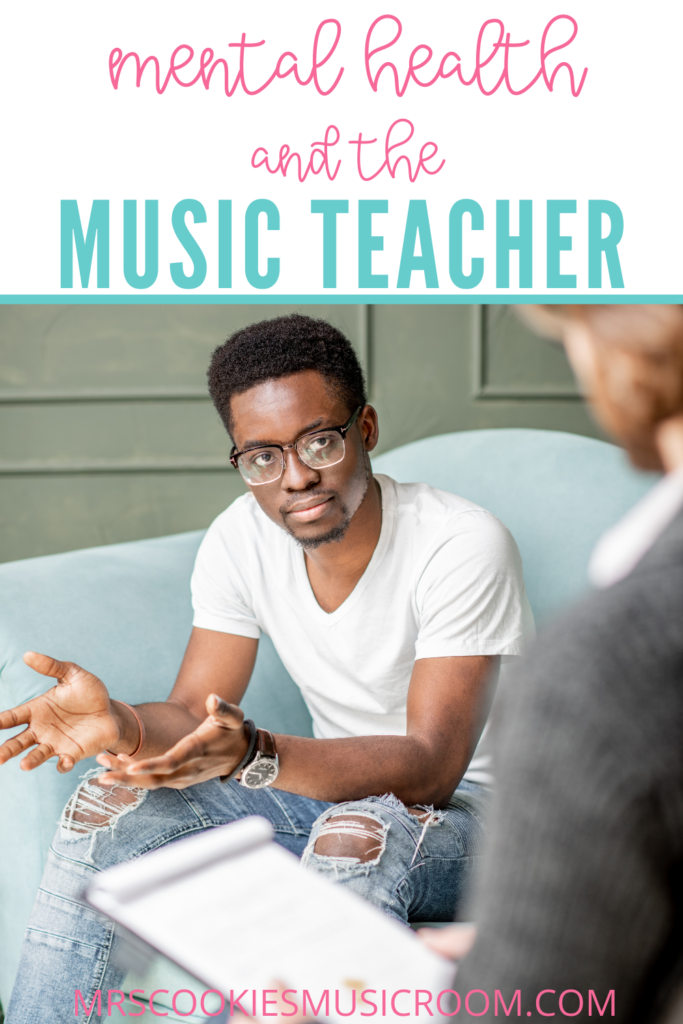May is Mental Health Awareness Month, which has a special place in my heart. If you’ve been following me for a little while, especially on Instagram, then you’ve probably seen me share about my struggle with mental health over the years. If not, I’ll start out with my mental health history before getting into my tips. Whether you have a diagnosed mental illness or not, I hope the tips in this post can help you be a happy and healthy music teacher.
My Background
For as long as I can remember, I’ve had an anxiety disorder. My OCD and misophonia started showing up in junior high. Depression began looming over me in high school, and all the while, I had undiagnosed ADHD. So… I guess it’s safe to say I’m neurodivergent. I started college in 2006, when mental illness had a much bigger stigma. Although it was quite obvious that I had issues, my parents and I hadn’t ever sought treatment After all, I wasn’t “crazy.” Sidenote: the fact that people actually believed that only insane people needed mental healthcare is horrifying.
Placing a teenager with untreated mental illnesses into an isolating and stressful environment (first year of college) went about as well as you’d expect. Everything got worse, and I kept ignoring it. However sophomore year it became difficult to function, let alone hide my issues. Finally I gave in and visited the counseling center on campus. It was during my weekly appointments that I realized the extent to which my disorders were ruling my life. By the end of that school year, I was on medication, and I had a psychologist at home lined up for summer break.
Turning Point
That second year of college when I finally accepted my mental illness was a big turning point for me. Don’t get me wrong; there have most definitely been dips since then. Life situations change, medications need altering, and therapists switch practices. But realizing that my mental health needs to be prioritized just like my physical health was a major breakthrough. Having anxiety, depression, or any other mental illness is not something to be ashamed of, and you are far from alone.

Tip #1: Go Pro
If you are struggling, ask for help. Perhaps you’re experiencing anxiety because of the very stressful school year we have had. Maybe you have been noticing issues for years, but never addressed it. Either way, seek therapy and/or medication if you think it could benefit you in your current situation.
A few thoughts about professional help:
- Most districts have an Employee Assistance Program, which covers a certain number of counseling sessions.
- If you worry about finding therapists who fit with your busy schedule, there are many flexible online options now, such as BetterHelp and Talk Space.
- To cut on costs, your primary care physician may be able to prescribe your medication, depending on your situation.
- Don’t let the stigma of medication keep you from getting to your healthiest self. If you had diabetes, you wouldn’t refuse an insulin prescription. If you have a chemical imbalance in your brain, should you refuse medication that would help correct that imbalance?

Tip #2: Set Boundaries
One of the things that most teachers are terrible at is setting boundaries. We want to give so much, especially for the sake of the children. But if we want to make this career sustainable for ourselves and for our students, we must set boundaries. We all know the statistics around teacher burnout, and we’re seeing huge numbers of teachers leaving the profession this year. Unless we are okay with being a part of those numbers, we need to be proactive. To read about my personal brush with burnout, click here.
Boundaries to set:
- Committees. How many committees are you required to be a part of? Make sure that you don’t surpass that number by more than one. The time spent on meetings and behind the scenes work adds up very fast.
- After hours commitments. Math Night, Fall Festival, food drives, school dances, etc. are all great ways to support your school community. But make sure that you spend your time wisely. Is it good to go to the band concert, run a booth at the carnival, and chaperone an event? You bet! But spending entire evenings and weekends at school is no good for anyone’s mental health. Make an appearance or volunteer for an hour-long shift, and then GO HOME.
- Clubs. Clubs are great; it’s how I teach my before-school choirs. However, keep the number of clubs you run to a manageable number. Want to run multiple clubs? Try offering different ones for different semesters or quarters, rather than filling every morning and afternoon with a different club to run.
- Bringing work home. This one is the trickiest, in my opinion. It’s safe to say that most of us enjoy lesson planning and cutting lamination, which makes the boundary a little harder to enforce. But aim to get your work done at work, and don’t even take any of it home. Of course there will be exceptions to this rule (concert season, report card grades due, etc.), but mostly, your work is for work. When completing a task, most people will use all of the time they’ve allotted for it, regardless of how much time the task actually requires. If you tell yourself that you only have until 4pm to do schoolwork, you can probably accomplish a great deal in that time frame.
- Email. Do you check your work email on nights and weekends? Stop! We teachers all need to have solidarity with this boundary. When you respond to emails at all hours of the night, that becomes normalized to parents and admin. But the thing is, that is far from normal. Don’t even have the work email on your phone, and stop checking your email after contract hours. If there really is that pressing of a matter, your admin will understand, and they’ll call you.

Tip #3: Listen to yourself.
If you’re feeling overwhelmed, take a minute to breathe and listen to yourself. This includes your mind as well as your body. If your mind and/or body are telling you they’ve had enough, take the dang sick day; your health comes first.
What to listen for:
- Negative self talk. Sometimes you won’t finish what you want to accomplish in a day. Does that make you a bad teacher? Absolutely not. There is only so much time in a day. As long as you use your time wisely, don’t you dare beat yourself up about not getting through that pile of papers. So if that negative self talk starts creeping in, shoo it away!
- Tension. Are your teeth clenched? Are you wearing your shoulders like earrings? Are you a little snippier with the kids? These are all clear signs from your body and your mind that you need a breather.
- Body/health issues. Beyond tension, the stress could cause you actual sicknesses and pains. TMJ, back pain, headaches, acid reflux, and many more issues are manifestations of stress. If you are experiencing any of those issues, your body is trying to literally force you to slow down.
- Exhaustion. Tired no matter what? Been there, unfortunately. Being on high alert all day every day will do a number on your physical health and mental health. The stress can exhaust you as if you ran a marathon.
Bonus tip: Treat yourself.
Self care is so much more than grabbing a favorite drink from Starbucks or using a face mask. Self care is literally taking care of yourself. So now that you’re listening to your mind and body, give them what they’re asking for. Tired? Get more sleep. Tense? Do some yoga. Stomach upset? Treat it to a nutritious meal. Mind racing? Try a meditation app. Remember that if you don’t make time for what you need, your body will force you by making you sick. Believe me.
So whether you’re in a busy season, fighting burnout, or think you might suffer with mental illness, I hope these tips help you. We all experience stress, and we all go through difficult situations, so don’t ever think that you are alone in your struggles. And if you ever want to talk, I’m here. 🙂
Happy teaching!






No Comments